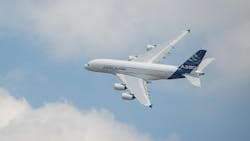Iran Drops A380s in Airbus Plan as Jet Struggles for Deals
Airbus Group SE (IW 1000/44) suffered a blow to its already troubled A380 program when Iran, which had previously suggested it would buy the double-decker planes, said it had dropped the model as part of a wider fleet upgrade.
Iran reduced its order with Airbus to 100 planes in a contract that will no longer include A380s, Farhad Parvaresh, Iran Air’s chief executive officer, said in a press conference in Tehran. This will shrink the original $27 billion agreement -- which wasn’t a firm contract -- for 118 jets, including 12 A380s. A team from Airbus is currently in Tehran for talks.
"Given there are now 100 planes in the contract, I don’t think that the overall value will exceed $10 billion, and that’s at the very most,” Parvaresh said. “The A330 was part of the deal from before and it still is, but there will be no A380."
Airbus has already cut production of its superjumbo by more than half, to one plane a month by 2018, as demand has dwindled. Dubai-based Emirates is the only carrier to give a major role to the giant aircraft, which is officially priced at $433 million but is usually offered at a steep discount. Iran, which is updating its aging fleet after U.S. sanctions were eased, is one of the few remaining untapped markets in which the plane-maker and rival Boeing Co. are competing for orders.
Airbus shares fell 0.7% to 63.76 euros at 9:21 a.m. in Paris trading, bringing the company’s valuation to 49 billion euros.
Iran’s deal with Airbus rival Boeing Co. to buy 80 aircraft for $16.6 billion is intact. That agreement, announced earlier this month, includes 50 737 MAX 8s, 15 777-300ERs and 15 777-9s to be delivered over 10 years starting in 2018.
Iran is prepared to fund the first $1 billion tranche for the planes in Airbus and Boeing contracts, said Asghar Fakhrieh-Kashan, the country’s deputy transport minister for aviation. Half of this will come from foreign financing, primarily through a leasing company. The remaining half will be raised via various sources, including $330 million from Iran’s sovereign wealth fund called the National Development Fund and $120 million from a domestic sukuk issuance.
By Golnar Motevalli and Deena Kamel Yousef
About the Author
Bloomberg
Licensed content from Bloomberg, copyright 2016.
